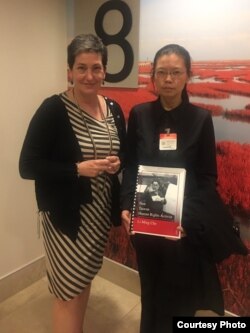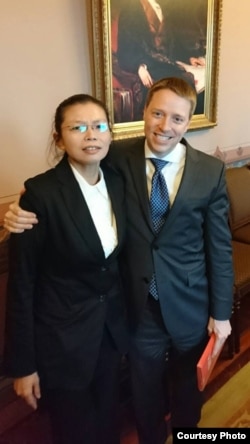After the Chinese government detained her husband on March 19, Ching-yu Lee, wife of Taiwanese nongovernmental organization worker Ming-che Lee, dedicated herself to a rescue mission that raises international awareness and seeks his release.
Ching-yu Lee received a warm reception from senior U.S. officials and congressional members during a recent trip to Washington.
A State Department spokesman told VOA on Wednesday that Virginia Bennett, the acting assistant secretary for democracy, human rights and labor affairs, greeted Lee and a delegation of wives of human rights activists who are detained in China.
"We are aware of reports that China has detained Ming-che Lee, a human rights advocate from Taiwan, under vague state security charges and without access to a lawyer or family," she said. "We urge the immediate release of all who have been detained for advocacy on behalf of democracy and human rights."
Flight to Macau
Lee, 42, disappeared on March 19 after a flight from Taipei to the Chinese territory of Macau and before crossing a land border into mainland China where a friend was waiting, according to his colleagues in Taipei. His whereabouts remain unknown.
Lee's wife pledged to "continue to move forward" with the rescue campaign.
"As human rights workers, we don't have the rights to be pessimistic," Lee said this week after returning to Taipei.
Matthew Pottinger, White House National Security Council senior director for Asian affairs, shared his experience in a recent meeting, according to Lee. Pottinger was detained in 2004 when, as a reporter for The Wall Street Journal, he was covering news in a village in China's Jiangsu province.
Pottinger told Lee to help her husband "learn to let go," if released, of all kinds of humiliation and torture that may occur during isolation and secret interrogation. "Help him to be at peace with himself," said Pottinger, Lee recalled in a blog.
Lee's case has sparked debate about whether China has the right to jail him.
China claims democratically ruled Taiwan is part of its territory, and it has never renounced the use of military force to bring the island under Beijing's control. The U.S. broke diplomatic ties with Taiwan in 1979.
Some ties continue
The Taiwan Relations Act (TRA) approved that year by Congress allows the continuation of "commercial, cultural and other relations between the people of the United States and the people of Taiwan" in the absence of diplomatic ties.
"Nothing contained in this act shall contravene the interest of the United States in human rights," the TRA says. "The preservation and enhancement of the human rights of all the people on Taiwan are hereby reaffirmed as objectives of the United States."
Ross Darrell Feingold, a Taiwan-based American lawyer and political risk consultant, told VOA, "China's government won't be persuaded by arguments that it lacks the jurisdiction to detain Lee, as it will, of course, cite its broad national security laws as a sufficient reason to detain him."
Feingold, who is the Asia director of the Association of American Residents Overseas, said Lee's case is different from others. While there is a recent history of numerous detentions involving both foreign businesspersons and nongovernmental organization workers, "often those detained are based in China, rather than short-term visitors," he said.
Coen Blaauw, a spokesman for the Washington-based Formosan Association for Public Affairs, which promotes Taiwan's self-determination, told VOA that by "arresting and detaining Taiwanese citizens," the Chinese do not "enamor them to the people of Taiwan."
Looking to Congress
Lee and wives of other human rights activists detained by China — mainland lawyers Jingling Tang, Tianyong Jiang and Yang Xie — issued their appeals at a recent congressional hearing, calling on Washington to press Beijing to free activists and end torture.
ChinaAid, a U.S.-based nonprofit Christian human rights organization, said the wives presented the cases of their jailed husbands to American lawmakers May 18, asking them to "examine the torture, disappearances and detention of human rights lawyers and democracy advocates in China."
ChinaAid facilitated the meetings of activists' wives with U.S. officials and congressional members.
Amnesty International said Lee's detention raises fears that China is broadening its crackdown on legitimate activism, and it urged authorities to provide further details about his detention.






